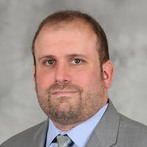I'll tell you what I've told a number of other people. The COVID-19 has advanced healthcare in its move from inpatient to outpatient by 5 years.
If I were to go back in time and tell you in January/February that the majority of appointments were going to be done via telemedicine or that the cost curve of basically the intersection of inpatient, outpatient revenues that outpatient revenues are going to exceed inpatient revenues 5 years ahead of schedule you probably wouldn't believe it. Or that the number of telemedicine visits was going to go up so much that the Department of Health and Human Services authorized the use of platforms that were not certified for telemedicine, you probably would not believe me and that's actually what happened.
That was part of the waiver that they did, so we had to move very quickly as an organization to pivot to address security concerns and to make sure we could rapidly onboard new equipment. Not only for patient care, but also for laboratory testing and then for telemedicine turn around on a dime to build out new systems, new structures and new processes. To be able to do this, we've advanced 5 years in 3 months and I am not exaggerating when I say this.
I will also tell you that the impacts from COVID are going to permanently impact healthcare and accelerate further development of what we call "hospital at-home" technologies: A stronger push for telemedicine and a stronger push for remote monitoring which is correspondingly going to completely change how we do medical device security as well.
How we look at security is going to move from "hey, we have a firewall" or "hey, we have defense-in-depth" to guess what, we're going to be sending patients home, we need to monitor them, this is how we are monitoring them, make sure the entire distributed process is secure.
So we're moving from islands to distributed very, very quickly and it's going to be a wild ride! Especially given that the 21st Century Cures Act Final Rule just got passed in March. Ironically, right before COVID happened and they started canceling all the big conferences like HIMSS.
What is going to happen is we are gonna have to very quickly act to get good security standards up and running much quicker than we thought we were and we're gonna have to act as a community to do so in the absence of effective legislation.


